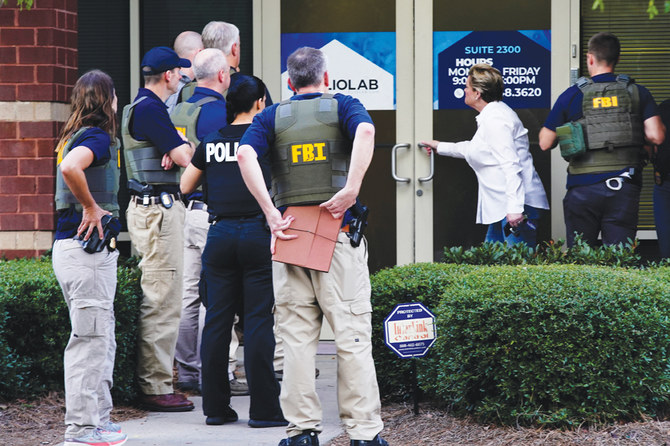WASHINGTON: US federal agents raided genetic testing laboratories, and 35 people were criminally charged in four states in a crackdown on genetic testing fraud that officials said caused $2.1 billion in losses to federal healthcare insurance programs.
Officials at the Justice Department and Health and Human Services Department Office of the Inspector General said that charges were filed in Florida, Texas, Louisiana and Georgia in “one of the largest healthcare fraud schemes ever charged.”
Among those facing charges was Khalid Satary of Suwanee, Georgia, owner of Clio Laboratories in Lawrenceville, Georgia, who was accused in an indictment of soliciting medically unnecessary genetic cancer tests and paying illegal bribes and kickbacks. Satary is a convicted felon who previously ran a toxicology lab that went bust in 2016 amid an ongoing federal probe into illegal kickbacks.
Several labs connected to Satary, including Clio, were featured in a special report by Reuters on Wednesday that raised questions about Clio’s Medicare billing practices and whether genetic tests the lab performed on elderly people were medically necessary.
A Reuters journalist early on Friday witnessed agents from the FBI and the US Department of Health and Human Services inspector general’s office search Clio, Elite Medical Laboratories and medical billing company Laboratory Experts, which are all located in the same business complex. All three of those companies are connected to Jordan Satary, the son of Khalid Satary. Neither father nor son could be reached for comment.
Victoria Nemerson, Clio’s general counsel, did not respond to requests for comment. Nemerson previously said that Clio’s testing is proper and that the firm commits “substantial time and resources to meeting our legal duties.”
The use of genetic testing, which helps people to determine their risks of developing cancer and other diseases, has skyrocketed in the US since 2015.
For Medicare, the public insurance program for elderly and disabled Americans, payouts for genetic tests jumped from $480 million in 2015 to $1.1 billion in 2018, a Reuters analysis found.
Genetic testing has sparked more than 300 federal investigations involving healthcare fraud and illegal kickbacks.
The fraud schemes typically involved marketers’ hiring sales reps to get elderly people to provide a cheek swab that they are told could be tested to help them understand their risks of developing cancer or whether their genetics could unlock clues about how they will respond to drug treatments. Doctors signed off on the tests as being medically necessary, and the swabs were sent for testing to labs that sought Medicare payments. But many of the lab tests are not relevant to the patient’s history, and some of the doctors sign off on the results without conferring with the patient, investigators say.
By law, all diagnostic lab tests must be ordered by a doctor treating a patient for a specific condition.
Others charged included Minal Patel, the founder of Georgia-based LabSolutions, and Jamie Simmons, the founder of two telemedicine companies called MedSymphony and Meetmydocc.
Lawyers for Patel and Simmons could not be immediately reached.
Patel is accused of defrauding the Medicare and Medicaid insurance programs in connection with genetic cancer tests and paying kickbacks. Simmons is charged with conspiring to commit healthcare fraud and paying and receiving kickbacks that led to Medicare billings of more than $56 million.

























